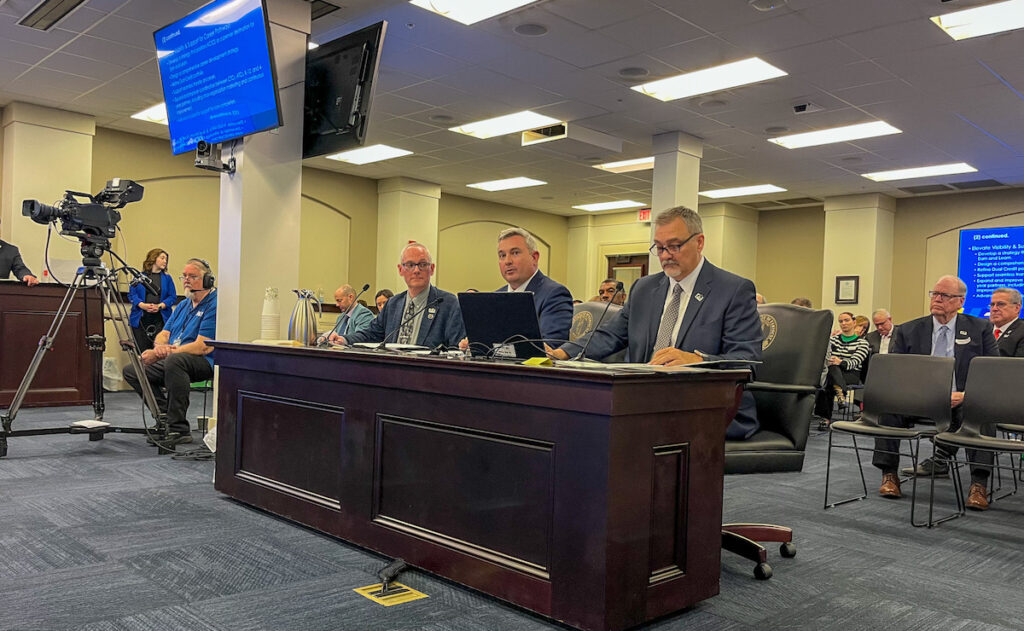FRANKFORT, Ky. — Lawmakers received a report with nearly a dozen recommendations from the Kentucky Community and Technical College System with steps aimed at improving the two-year college system.
The KCTCS Board of Regents approved the 11 recommendations last week, which included changes to KCTCS’s governance, making the system the sole provider of dual credit courses in Kentucky and evaluating areas for possible mergers and consolidations. During the Thursday board meeting, KCTCS President Ryan Quarles said the recommendations were an opportunity for the college system to “redefine ourselves.”
Senate Joint Resolution 179, legislation passed earlier this year, required KCTCS to complete a system review and report findings to lawmakers by Tuesday. Senators and House members on the Interim Joint Committee on Education heard the recommendations during Tuesday’s meeting, but due to time constraints for the committee, Co-chair Rep. James Tipton, R-Taylorsville, directed lawmakers to submit questions they may have via email.

After the meeting adjourned, Tipton told the Kentucky Lantern that “any thing of substance that takes place is probably going to require some legislative action.” The General Assembly reconvenes next month. Tipton added that some steps could be taken in 2025, but some may have to wait until the state’s next budget legislative session in 2026.
“They’ve got new leadership, and they seem to be moving in the right direction now,” Tipton said of KCTCS. “So we’ll continue to monitor because that’s our responsibility.”
Quarles, a former Republican agriculture commissioner, gubernatorial candidate and House member, became president of KCTCS in January. He told the committee that he “was hired to fix and improve KCTCS, and that’s exactly what I’m doing.” Quarles also highlighted additional recent reviews of the system, such as a Huron Consulting Group study and a forensic audit.
“We felt that it’d be important that we chart our own path instead of having it prescribed to us,” Quarles said of the SJR 179 recommendations. “You asked us to be bold and innovative, and we did this on our own. This is a homegrown project from KCTCS.”
KCTCS has more than 100,000 students across 16 colleges within Kentucky.
Quarles noted that the Council on Postsecondary Education disagreed with the recommendations regarding KCTCS becoming the sole provider of dual credit and establishing a common course numbering for all public Kentucky institutions for 100- and 200-level courses to help with transferability of credits between the two-year and four-year institutions. Quarles said the two-year college system provides about 71% of dual credit courses in the commonwealth.
CPE President Aaron Thompson told the Lantern after the meeting that he does agree with most of the recommendations KCTCS made except for those two.
On the dual credit issue, Thompson said Kentucky should look to expand dual credit courses instead of limiting them. Other public and private universities offer the remaining 29% of dual credit courses.
“We need to focus on the quality and the alignment,” Thompson said.
As for the common course numbering recommendation, Thompson said accreditation issues between institutions can still occur. He added that he believes “the competencies and the learning outcomes are similar or the same” for KCTCS graduates and dual credit learners in high school no matter what the course numbers are.
CPE monitors higher education at Kentucky’s eight public universities and KCTCS.
This article is republished under a Creative Commons license from Kentucky Lantern, which is part of States Newsroom, a network of news bureaus supported by grants and a coalition of donors as a 501c(3) public charity. Kentucky Lantern maintains editorial independence. Contact Editor Jamie Lucke for questions: info@kentuckylantern.com. Follow Kentucky Lantern on Facebook and Twitter.
McKenna Horsley covers state politics for the Kentucky Lantern. She previously worked for newspapers in Huntington, West Virginia, and Frankfort, Kentucky. She is from northeastern Kentucky.






